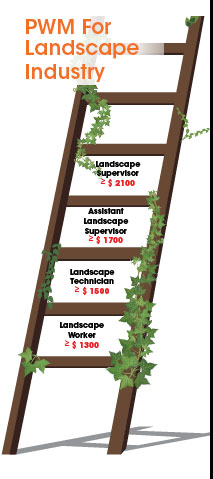Singapore has earned a reputation for being a ‘Garden City’ through the vision of capable leaders, decades of planning, and the cultivation and conservation of greenery in the urban city. This reputation, however, would not have been possible without the labour of landscape workers.
In an effort to attract and retain manpower, the Progressive Wage Model (PWM) for the Landscape Industry was launched on 24 April 2015 by the Tripartite Cluster for Landscape Industry (TCL). The event was held at Gardens by the Bay and was led by NTUC Assistant Secretary-General (ASG) and TCL Chairman Zainal Sapari.
Covering Resident Workers
While there are three landscape sub-sectors with rank-and-file workers, the PWM will only be implemented in the landscape maintenance sub-sector. The other two sub-sectors are landscape construction and landscape nursery.
TCL said that a PWM for the landscape maintenance sub-sector would cover most outsourced resident landscape workers, according to its assessment.
As recommended by the TCL, the PWM will consist of four levels (see ladder, right). The different levels take into consideration the level of responsibilities of each landscape worker.
The recommended entry level basic monthly wage for a landscape worker is $1,300 and will increase as the worker becomes better skilled, more productive and takes on higher responsibilities.
Since 2009, the median basic wage for resident landscape workers has been at around $1,000.
The National Wages Council’s (NWC) 2014/2015 guidelines were also taken into account when the TCL made its recommendations.
From June 2016, the PWM for the landscape industry will be a mandatory condition for companies that want to be registered under the Landscape Company Register (LCR) administered by the National Parks Board (NParks).
Complementing Existing Programmes
All stakeholders of the landscape industry were also urged to make full use of several schemes by agencies such as NParks, Singapore Workforce Development Agency (WDA), and the Devan Nair Employment and Employability Institute (e2i) to assist them in embarking on the PWM and productivity improvements.
“The PWM for the landscape industry will complement existing programmes that are already in place to raise skills and standards of the industry. As we take further steps to push for higher wages and better career prospects for our landscape workers, we hope to make landscaping a viable option for jobseekers, and a rewarding one as well,” said ASG Zainal.
According to TCL, landscape workers would be required to fulfil specific training requirements based on the Singapore Workforce Skills Qualifications for Landscape (Landscape WSQ) under the PWM. This in turn will lead to a skilled workforce, encourage landscaping companies to compete based on value and performance rather than price, assuring service buyers of higher quality services.
(Source: NTUC This Week – Original online article can be found here)

